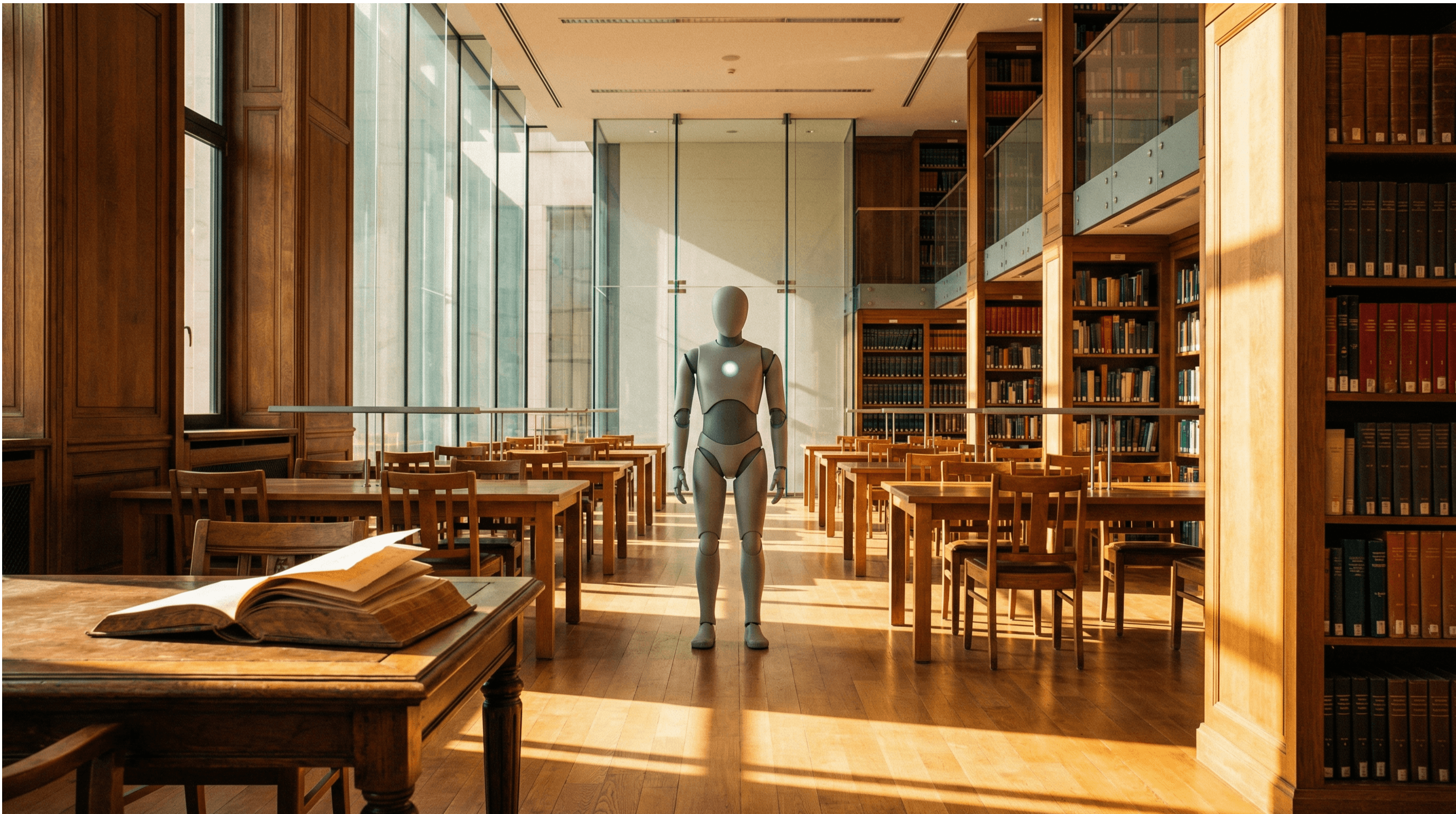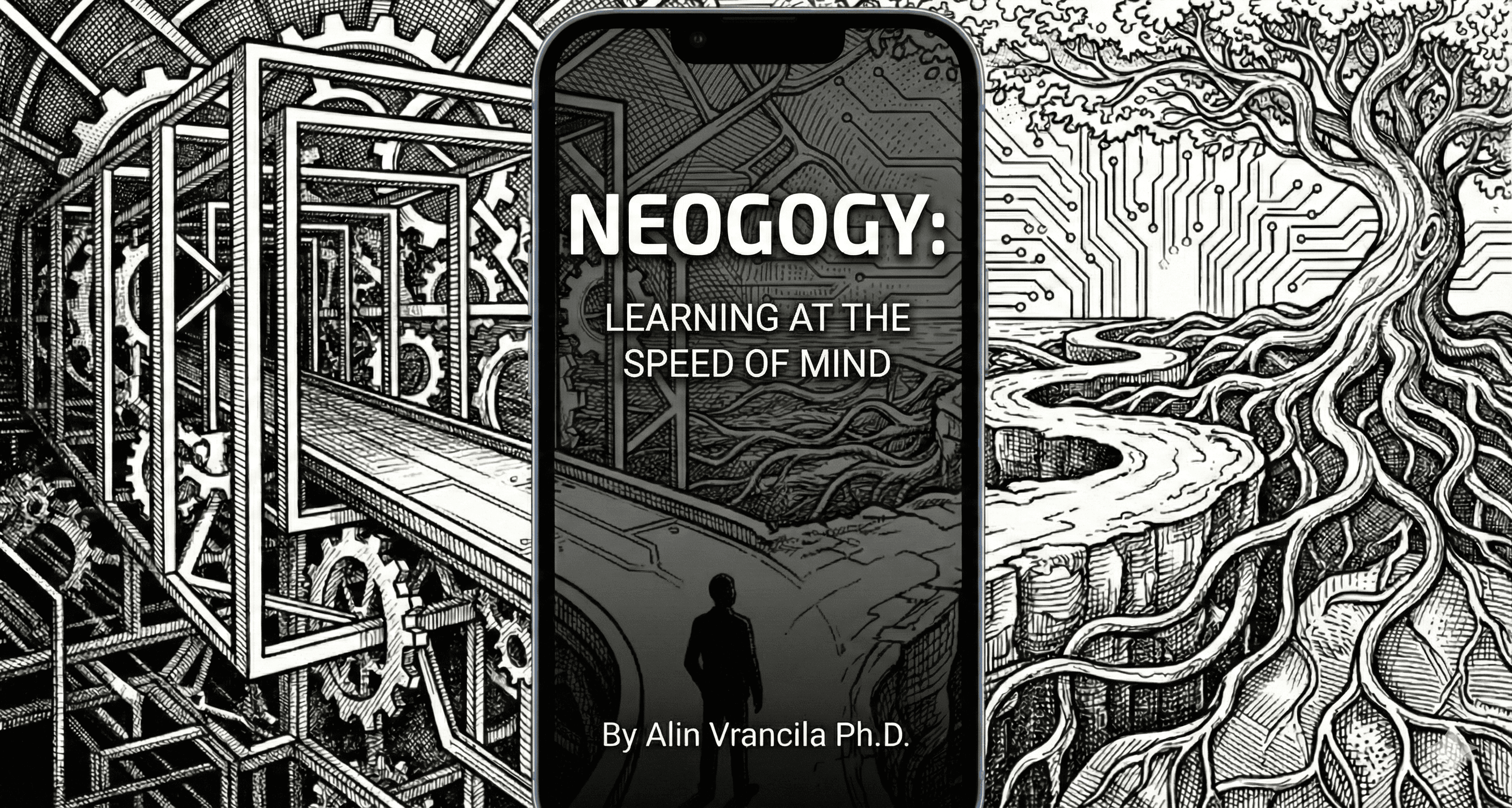Part 1 of 5: The AI Learning Revolution Series
Cognitive Debt and That Hollow Feeling: When AI Does Your Thinking For You
Picture this: It's 2 AM, and Sarah, a college junior, stares at her laptop screen with the kind of desperation that only comes from procrastination meeting deadline. She has a 2,000-word essay due in six hours, and she hasn't written a single word. Her cursor blinks mockingly in the empty document, like a tiny digital metronome counting down to academic doom.
Then she remembers, ChatGPT.
Within minutes, she's crafted what she thinks is the perfect prompt, and elegant paragraphs begin flowing across her screen like magic. The relief is immediate and intoxicating. The essay practically writes itself. She makes a few tweaks here and there, adds her name at the top, and hits submit with hours to spare. Victory!
Sarah feels productive, even clever. She's solved her problem efficiently, leveraged technology like the digital native she is. She's beaten the system, outsmarted the deadline, and probably gotten a better grade than she would have with her own rushed writing.
But as she closes her laptop, something nags at her, a hollow feeling she can't quite name. She's completed the assignment, but has she learned anything? More troubling, when she tries to recall what she "wrote" just hours later, the content feels foreign, like someone else's thoughts wearing her name tag at a conference.
If you've used AI tools for any kind of cognitive work, writing, analysis, problem-solving, you probably know this feeling. It's that weird disconnect between feeling productive and feeling... empty. Like you've eaten a meal that filled you up but provided no nutrition.
The "Something's Not Right" Epidemic
I've been having conversations about this hollow feeling with students, professionals, and educators for months now, and the responses are remarkably consistent. People describe feeling "fake," "disconnected from their own work," or like they're "curating someone else's thoughts." One student told me, "I can produce better work than ever before, but I feel dumber than ever."
That last comment stopped me in my tracks. Better work, but feeling dumber? How is that possible?
It turns out, this isn't just a psychological quirk or a case of impostor syndrome. There's actual science behind that hollow feeling, and it's more concerning than any of us realized.
I started noticing this pattern in my own work about six months ago. I'd been using AI tools for research, writing, and analysis, and initially, I felt like I had gained superpowers. Complex topics that once required hours of reading and synthesis could be understood in minutes. Writing that once involved painful drafting and revision flowed effortlessly from my fingertips.
But gradually, something shifted. When I tried to work without AI assistance, my thinking felt sluggish and unfocused. Ideas that once came naturally now felt forced. The cognitive muscles I had spent years developing seemed to have weakened from disuse. I was experiencing what researchers are now calling "cognitive debt", and I didn't even know it had a name.
The Cognitive Debt Trap
Think of cognitive debt like financial debt, but for your brain. Every time you outsource a thinking task to AI, you get immediate relief, the mental equivalent of buying something on credit. The task gets done, the pressure is off, and you feel productive. But just like financial debt, cognitive debt accumulates interest over time.
The "interest" on cognitive debt isn't measured in dollars, it's measured in diminished thinking capacity. Each time you let AI do the cognitive heavy lifting, your mental muscles get a little weaker. Your brain, being the efficient organ it is, starts to adapt. Why work hard when the AI can do it better and faster?
The problem is that this adaptation happens below the level of conscious awareness. You don't wake up one morning and think, "Gee, I seem to have lost the ability to think independently." It's more subtle than that. You just start reaching for AI assistance more quickly, relying on it for increasingly basic tasks, and feeling less confident in your own cognitive abilities.
Dr. Nataliya Kosmyna and her colleagues at MIT's Media Lab decided to investigate this phenomenon scientifically, and what they found should fundamentally change how we think about AI tools [1]. They literally watched people's brains while they used ChatGPT, using electroencephalography (EEG) to monitor brain activity across 32 regions.
The results were striking. Participants using ChatGPT showed dramatically reduced brain connectivity compared to those working independently. When people used AI assistance, their brains literally became less active, less connected, less engaged. It was as if the AI wasn't just helping with the task, it was replacing the cognitive work entirely.
But here's the really concerning part: this wasn't just a temporary state. The researchers documented what they called "progressive neural degradation" over time. With each subsequent AI-assisted task, participants showed increasingly reduced brain engagement. Their minds were learning to disengage, to let the AI do the thinking.
The Switching Cost: Why Going Back Is So Hard
The MIT study included a particularly revealing experiment. After participants had completed several tasks with ChatGPT assistance, researchers asked them to complete a task without AI help. The results were sobering.
Former ChatGPT users struggled significantly when forced to work independently. They showed reduced brain connectivity and had difficulty recalling their own previous work. It was like asking someone who had been using a calculator for months to suddenly do mental math, the cognitive muscles had atrophied from disuse.
This "switching cost" explains why that hollow feeling is so persistent. It's not just psychological, it's neurological. Your brain has literally adapted to AI assistance, and removing that assistance leaves you cognitively hobbled, at least temporarily.
I experienced this switching cost personally when I decided to write a complex analysis without AI assistance after months of AI-augmented work. The cognitive effort felt overwhelming. Ideas that once flowed naturally now required intense concentration. The mental stamina I had once taken for granted seemed to have evaporated.
It was like trying to run a marathon after months of riding in a car. The muscles were still there, but they had weakened from disuse.
The Productivity Illusion
Here's where things get really interesting, and really concerning. While all this cognitive degradation is happening, users consistently report feeling more productive and capable when using AI tools. The MIT study participants felt like they were performing better, even as objective measures showed their brains becoming less engaged.
This creates what I call the "productivity illusion", the feeling that you're accomplishing more while actually developing less capability. It's like feeling fit because you can travel long distances quickly in a car, while your actual physical fitness deteriorates from lack of exercise.
The illusion is so powerful that even experts fall for it. When researchers surveyed specialists in economics and machine learning about AI's impact on productivity, they predicted massive improvements. But when actual performance was measured objectively, the reality was often quite different.
This disconnect between perception and reality is perhaps the most dangerous aspect of our current AI moment. If we can't accurately assess the impact of these tools on our own cognitive capabilities, how can we make rational decisions about when and how to use them?
The Students Know Something's Wrong
Perhaps the most heartbreaking evidence comes from students themselves. When researchers survey students about their experiences with AI tools, they find something remarkable: the students know.
They can articulate that heavy reliance on AI is leading to a decline in the quality of their work. They worry that overreliance on AI will reduce their critical thinking, creativity, and communication skills. They understand intuitively what the neuroscience is proving empirically.
Yet they can't stop. The convenience is too compelling, the immediate benefits too obvious, the cognitive costs too abstract and delayed. They're caught in a trap of their own making, aware of the problem but unable to escape it.
One student described it to me this way: "It's like knowing that fast food is bad for you but being surrounded by McDonald's and having no time to cook. You know it's not good for you, but what choice do you have?"
Why This Matters More Than You Think
You might be thinking, "Okay, so AI tools make us a bit cognitively lazy. So what? We have calculators and GPS, and humanity survived those technological shifts."
But this is different. Calculators replaced arithmetic, a specific, narrow skill. GPS replaced navigation, useful, but not fundamental to how we think. AI tools are replacing thinking itself, the very cognitive processes that make us human.
We're not just talking about convenience or efficiency. We're talking about the systematic erosion of human cognitive capability. We're talking about a generation of students who can produce sophisticated work without developing the thinking skills that work is supposed to teach. We're talking about professionals who feel more capable while actually becoming less so.
The hollow feeling that Sarah experienced after submitting her AI-written essay? That's not just guilt or impostor syndrome. That's her brain recognizing that something essential is missing, the cognitive engagement that transforms information into understanding, that turns tasks into learning, that makes work meaningful.
The Path Forward: Why We Need Neogogy
Here's the thing: I'm not anti-AI. I believe these tools have tremendous potential to enhance human capability and solve complex problems. But I've come to understand that how we integrate them matters more than we ever imagined.
We need new frameworks for thinking about learning and cognitive development in the age of AI. We need approaches that harness AI's power while preserving and enhancing human thinking capabilities. We need what I call "neogogy", a new way of guiding learning that acknowledges both the promise and the peril of our AI-augmented future.
Traditional education was designed for a world without AI. It assumed students would do their own cognitive work, that effort and outcome would be correlated, that assessment could reliably measure learning. AI has shattered these assumptions, and we need new frameworks that account for this reality.
Neogogy isn't about banning AI tools or returning to some pre-digital past. It's about learning to dance with artificial intelligence rather than being led by it. It's about preserving what makes us uniquely human while leveraging the power of AI to enhance rather than replace our cognitive capabilities.
The hollow feeling that so many of us experience when using AI tools isn't a bug, it's a feature. It's our brain's way of telling us that something important is missing. The question is: are we going to listen?
In the next post, I'll dive deeper into the science behind these feelings and share research findings that will change how you think about AI tools forever. Spoiler alert: your brain is trying to tell you something important, and it's time we started listening.
References:
[1] Kosmyna, N., Hauptmann, E., Yuan, Y. T., Situ, J., Liao, X. H., Beresnitzky, A. V., Braunstein, I., & Maes, P. (2025). Your Brain on ChatGPT: Accumulation of Cognitive Debt when Using an AI Assistant for Essay Writing Task. arXiv preprint arXiv:2506.08872.
Next in this series: "Your Brain on AI: The Science That Will Change Everything" - where we explore the shocking research findings that reveal what's really happening in your mind when you use AI tools.





